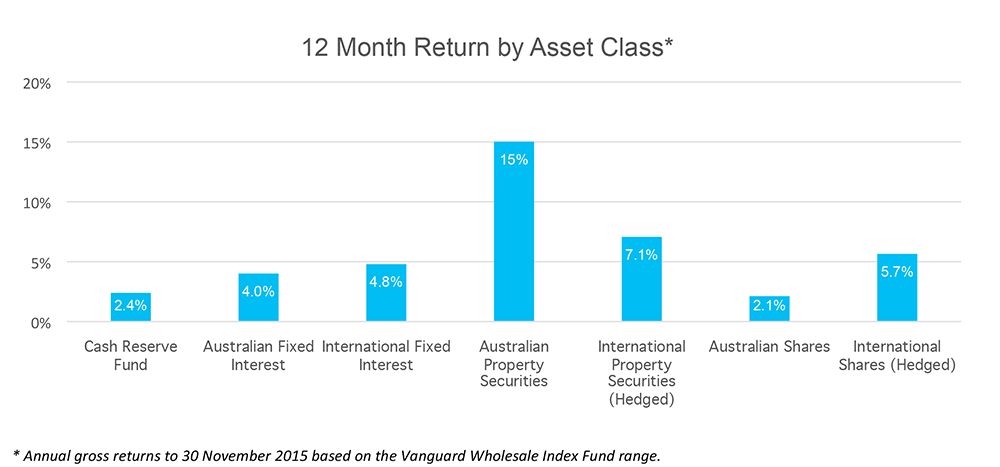With 2015 drawing to a close now is a good time to reflect on the year that was and consider what’s in store for 2016.
2015 provided investors with some ups and downs as the world processed some significant events that impacted financial markets, including;
- The Syrian Conflict
- The terrorist attacks in Paris
- The Greek Government debt crisis and default on IMF payment
- A magnitude 7.8 earthquake in Nepal
- The change in liberal leadership.
The above events coupled with fears of an emerging markets crisis, uncertainty around the impact of the Federal Reserve raising interest rates and, in Australia, concerns around a property bubble, the end of a resources boom and a falling dollar have translated to conservative returns and a lot of skittish investors.
We have seen another year of subdued global growth (circa 3%) due, in part, to a downturn in Japan, further decline in China and deepening recessions in Brazil and Russia. While slower global growth isn’t necessarily a big negative, it has caused additional nervousness in the financial markets which translates to less investors entering the market.
How did each asset class perform?
As the below graph illustrates, while none of the major asset classes experienced negative performance it wasn’t’ a year of exiting growth. Some investors may have received additional growth from holding assets in US Dollars – that is not reflected in the Index Funds below and may have added up to 12% for unhedged international share funds over the period.

What’s in store for 2016?
Most economists and market participants don’t have a positive outlook for 2016, with most anticipating local shares to produce growth of between 2 and 4%.
AMP’s Shane Oliver provided the below summary in a recent edition of Oliver’s Insights:
“No doubt those who were looking for economic mayhem to break out in 2015, will simply roll their expectations for disaster into 2016. However, there are good reasons to believe we will simply see a continuation of the constrained uneven global growth that we have been seeing over the last few years.
- Major economic downturns are invariably preceded by either economic or financial overheating and there are no signs of that. There has been no major global bubble in real estate or business investment, inflation remains low, share markets are not unambiguously overvalued and global monetary conditions are easy. In terms of the latter while the Fed is likely to raise rates the process is likely to be gradual reflecting constrained US growth and still low inflation. And monetary easing is set to continue elsewhere, which in turn will also limit the extent of Fed tightening to the extent it puts upwards pressure on the value of the $US. As such, apart from a left field shock, it is hard to see what will drive a major global economic downturn at present.
- At the same time, it is hard to see what will drive a sharp acceleration in economic growth either. Rather, the structural combination of slower population growth, a more cautious approach to debt and structural problems in the emerging world will keep a lid on global growth.”
What is our Approach?
Our approach to investing remains much the same as it has been since Satori Advisory was founded. We firmly believe that an investment philosophy should focus on the elements that can be controlled, rather than those that can’t.
Asset Allocation:
Ensure your portfolio reflects your attitude to investing, contains a diversified mix of asset classes and is suitable for the goal it is attempting to achieve. As an example, a 30 year old investing his or her Superannuation may be able to take on a larger allocation to equities as they have a 35 year investment horizon. If that same individual is also saving for a home and expects to save their deposit within 2 years it’s unlikely that shares or an investment property would be suitable!
Reduce Costs:
In 2015 we undertook a comprehensive review of the financial products we recommend for our clients. This review was completed to ensure our clients gained access to portfolio’s that we believe provide the best opportunity to achieve their objectives.
Our portfolios have index funds as the ‘core’ of the portfolio and a smaller allocation to actively managed funds as the ‘satellite’.
As the name suggests, index funds track the performance of a particular index, such as the ASX200 or S&P500. Typically these funds provide exposure to a large range of assets at a fraction of the cost (when compared with Active Funds).
Keep it simple:
We don’t believe our clients need complex and expensive financial instruments, daily monitoring or constant trading. We have seen no evidence that attempts to ‘time the market’ have succeeded consistantly. We believe a portfolio that is built economically and one that is monitored and rebalanced regularly will provide investors with the best outcome.
If you’d like further information or would like to discuss your portfolio with an adviser please contact our team on 1300 925 081.




